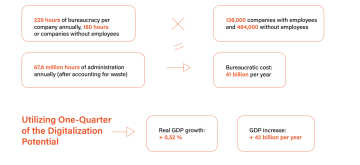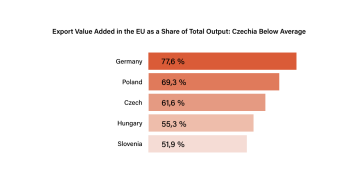Empowering Small Businesses in Czechia: Action steps from the SME Forum in Prague
19. 11. 2025
What do small businesses truly need to grow? And how can Czechia save 83 billion CZK annually? These were some of the key questions discussed on October 17 at the SME Forum in Prague’ — a roundtable organized by Mastercard and the DoToho! platform as part of the national initiative Velký týden malých firem (The Small Business Week). The discussion brought together entrepreneurs, ministry representatives, innovation agencies, associations, chambers, and corporate leaders to identify practical actions addressing bureaucracy, digitalization, export potential, education, and public trust.
“We care deeply about small businesses. We recognize their courage, their importance and what they contribute to the economy and society. We also know they continually face new challenges — from geopolitical uncertainty to the aftermath of the pandemic, and digitalization is not always easy to navigate. Our goal was not only to create a platform to celebrate and support small cafés, manufacturers and other local firms, but also to connect the private and public sectors to provide meaningful support together. Today is about understanding and discussing the steps we can take, collectively,” said Jana Lvová, General Manager of Mastercard Czechia and Slovakia, in her opening remarks.
SMEs represent 99% of all enterprises in Czechia and employ more than half of the workforce. Yet many face mounting challenges: regulatory obligations and compliance, limited access to financing, geopolitical uncertainty and barriers to digital tools. These frictions slow growth and weaken resilience — not just for individual firms, but for the wider economy.

Bureaucracy, digitalization and export: Where potential remains untapped
An exclusive study commissioned by Mastercard and prepared for the initiative and presented by economist Dominik Stroukal quantified both the scale of the bureaucratic burden and the potential gains from digital transformation. Small businesses in Czechia lose an estimated 67.6 million hours each year on administrative tasks — particularly those related to employee management — representing an annual cost of around 41 billion CZK. According to the study, if Czechia harnessed even a quarter of its untapped digitalization potential, the economy could gain an additional 42 billion CZK in value, increasing real growth by 0.52 percentage points. Combined, these findings reveal that up to 83 billion CZK could be saved or generated each year through smarter regulation, process simplification, and broader adoption of digital tools.
Stroukal described the urgency clearly: “It’s not that the train is leaving — it has already left. We’re not doing badly, but there is a lot of untapped potential. There is room for discussion and sharing, not only among small companies, but also in cooperation with large firms. We don’t have to look only to the UK, Denmark or the Netherlands. There are valuable lessons we can learn from Poland or Croatia.”
When asked why Czech export performance lags behind Austria, Stroukal added: “Even countries we would like to export to still see us as a cheap market. They don’t expect quality — they expect low-cost products. It’s a burden we carry from history.”
Despite strong entrepreneurial competences — recently ranked first in the European Commission’s skills agenda — Czech SMEs are not fully benefiting from digital sales channels, cybersecurity tools or export platforms.

European context: A stronger Single Market and risk preparedness
The European perspective was provided by Outi Slotboom, Director for Strategy and Economic Analysis at DG GROW and one of the most vocal advocates for SME support within the Commission. She highlighted the role of the Enterprise Europe Network, which provides advisory services and support to companies across local ecosystems, including internationalization assistance.
Slotboom referred to a recent Eurobarometer survey of 12,000 companies in the EU: “ Companies reported that they do not export due to differing national product regulations. Worker mobility, social security and recognition of professional qualifications are also barriers. And taxes were the fourth major obstacle.” She noted that the Commission referred to a Single Market Plan intended to reduce fragmentation and support business integration.
Financing, confidence and education
Financing remains an obstacle. According to the Czech Association of SMEs and Crafts, 47% of small businesses struggle to obtain funding. Existing guarantee schemes often face delays due to additional reporting requests, adding another layer of administrative friction. Further efforts to ensure that procedural steps advance without unnecessary delays could significantly improve the predictability and accessibility of guarantee schemes for small businesses.
Only 20% of young Czechs are interested in starting a business, often due to fear of bureaucracy and failure. Finland, where entrepreneurship education begins earlier, reaches 50%. Finnish entrepreneur Stina Siikonen explained: “Not every small company has to export. It’s about bringing value to the whole chain. Innovation is key, and we must equip entrepreneurs with the skills to make better business decisions.”
She described how Finland supports entrepreneurial learning from early education: “Young Entrepreneurs’ networks work with schools across the country, provide materials and teach teachers how to teach entrepreneurship. Local entrepreneurs are involved directly.”
Trust, collaboration and data-driven decisions
Throughout the Forum, trust emerged as a recurring theme. SMEs need confidence in public systems, supportive regulation and access to reliable data. Inspiration from already-working models across Europe can accelerate change without constant reinvention.
Pavel Přikryl, founder of Opero and the DoToho! program, emphasized: “We work to influence the environment in which small entrepreneurs operate and to ensure the ecosystem treats them better. We want to highlight working examples from abroad that can inspire progress — which is why this study was created.”
Action points
Katarína Kakalíková of Mastercard summarized the key action steps discussed:
● eliminate excess administrative burden,
● accelerate digitalization,
● expand entrepreneurial education,
● better connect small and large companies
● replicate proven solutions from abroad,
● provide — and demand — more data for evidence-based decisions.
“Trust matters. Small entrepreneurs need it — and they deserve it,” she concluded.
Looking ahead
The Small Business Week expanded to Slovakia in November and and is set to grow to other countries over the next years. Many of the challenges faced by Czech SMEs — from administrative load to digital skills — are shared across the region, making cross-border collaboration a strategic opportunity. As a new government begins to take shape in Czechia, this moment offers a unique opportunity to reimagine how small businesses are supported.
The SME Forum demonstrated that meaningful change begins with dialogue — but must continue with coordinated action. We believe that the data and insights gathered through this initiative can serve as a valuable resource also for policymakers seeking evidence-based solutions. By simplifying regulatory processes, enhancing digital capabilities, strengthening entrepreneurial education and building trust across sectors, Czechia can empower its small businesses to grow with greater confidence.